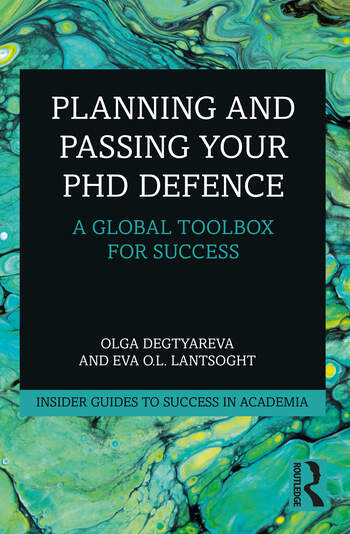Planning and Passing Your PhD Defence
Planning and Passing Your PhD Defence | A Global Toolbox for Success
About the Book
The ‘Insider Guides to Success in Academia‘ offers support and practical advice to doctoral students and early-career researchers. Covering the topics that really matter, but which often get overlooked, this indispensable series provides practical and realistic guidance to address many of the needs and challenges of trying to operate, and remain, in academia.
These neat pocket guides fill specific and significant gaps in current literature. Each book offers insider perspectives on the often implicit rules of the game — the things you need to know but usually aren’t told by institutional postgraduate support, researcher development units, or supervisors — and will address a practical topic that is key to career progression. They are essential reading for doctoral students, early-career researchers, supervisors, mentors, or anyone looking to launch or maintain their career in academia.
This book is a toolbox for PhD students to plan and prepare for the PhD defence regardless of their scientific discipline or location. The authors discuss various defence formats that are used internationally and identify the main differences and similarities.
With international examples, practical strategies, and tips from former PhD students and supervisors, this book unpacks the principles and unwritten rules underpinning the defence. Addressing planning and preparing for the doctoral defence, and what to do afterwards, this book covers topics such as:
- Understanding your defence format
- Preparing for committee questions
- Preparing mentally and dealing with anxiety
- Dealing with corrections, finalizing your graduation requirements and marking the end of your PhD trajectory.
This book is crucial reading for students across the world looking to defend their PhD thesis, and also for their supervisors and examiners.
About the Author

Dr. Lantsoght graduated with a Master’s Degree in Civil Engineering from the Vrije Universiteit Brussel (Brussels, Belgium) in 2008. She later earned a Master’s degree in Structural Engineering at the Georgia Institute of Technology (Atlanta, Georgia, USA) in 2009 and the title of Doctor in Structural Engineering from Technische Universiteit Delft (Delft, the Netherlands) in 2013.
The work experience of Dr. Lantsoght includes design work in structural and bridge engineering in Belgium (Establis, and Ney & Partners) and working as an independent consultant in structural engineering in Ecuador (Adstren).
Dr. Lantsoght is an active member of the technical committees of the Transportation Research Board in Concrete Bridges (AFF-30) and Testing and Evaluation of Transportation Structures (AFF-40), a member of the technical committees of the American Concrete Institute and Deutscher Ausschuß für Stahlbeton Shear Databases (ACI-DAfStb-445-D), and the joint ACI-ASCE (American Society of Civil Engineers) committee on Design of Reinforced Concrete Slabs (ACI-ASCE 421), and the ACI Committee on Evaluation of Concrete Bridges and Concrete Bridge Elements (ACI 342), and an associate member of the committees on Shear and Torsion (ACI-ASCE 445), and on Strength Evaluation of Existing Concrete Structures (ACI 437).
In the academic field, Dr. Lantsoght is a full professor at the Universidad San Francisco de Quito (Quito, Ecuador) and a tenured assistant professor at Technische Universiteit Delft (Delft, Netherlands). Her field of research is the design and analysis of concrete structures and analysis of existing bridges.

